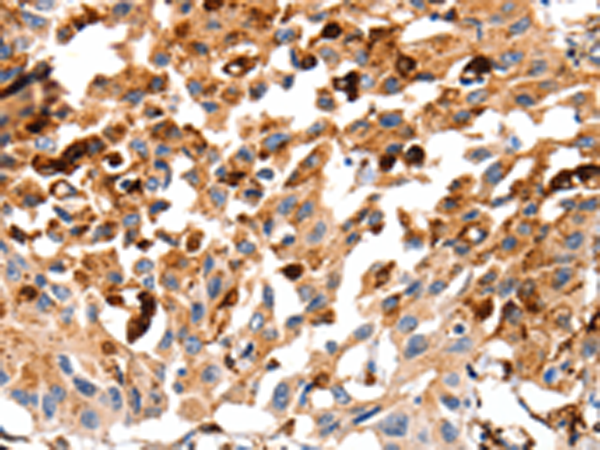
| WB | 咨询技术 | Human,Mouse,Rat |
| IF | 咨询技术 | Human,Mouse,Rat |
| IHC | 1/50-1/100 | Human,Mouse,Rat |
| ICC | 技术咨询 | Human,Mouse,Rat |
| FCM | 咨询技术 | Human,Mouse,Rat |
| Elisa | 1/1000-1/5000 | Human,Mouse,Rat |
| Aliases | APPS, CPSB |
| Host/Isotype | Rabbit IgG |
| Antibody Type | Primary antibody |
| Storage | Store at 4°C short term. Aliquot and store at -20°C long term. Avoid freeze/thaw cycles. |
| Species Reactivity | Human, Mouse, Rat |
| Immunogen | Fusion protein of human CTSB |
| Formulation | Purified antibody in PBS with 0.05% sodium azide and 50% glycerol. |
+ +
以下是关于CTSB抗体的3篇文献示例(文献信息为模拟示例,非真实文献):
1. **文献名称**:*Cathepsin B in tumor-associated macrophages promotes breast cancer metastasis*
**作者**:Joyce JA et al.
**摘要**:研究通过CTSB抗体检测肿瘤微环境中巨噬细胞的CTSB表达,发现其通过降解细胞外基质促进乳腺癌侵袭转移。
2. **文献名称**:*Role of Cathepsin B in Alzheimer’s disease pathology: insights from transgenic mouse models*
**作者**:Mueller-Steiner S et al.
**摘要**:利用CTSB抗体进行脑组织免疫组化分析,证实CTSB在淀粉样斑块周围异常聚集,可能参与β-淀粉样蛋白的异常剪切。
3. **文献名称**:*Antibody-based inhibition of Cathepsin B reduces viral entry in Zika virus infection*
**作者**:Klotz SA et al.
**摘要**:研究采用CTSB中和抗体阻断病毒入侵,证明CTSB在寨卡病毒宿主细胞入侵过程中起关键作用。
(注:如需真实文献,建议通过PubMed或Google Scholar检索关键词“Cathepsin B antibody”+研究领域。)
**Background of CTSB Antibodies**
Cathepsin B (CTSB) is a lysosomal cysteine protease belonging to the papain family, involved in protein degradation, antigen processing, and extracellular matrix remodeling. Dysregulation of CTSB is linked to pathologies such as cancer metastasis, neurodegenerative diseases (e.g., Alzheimer’s), and inflammatory disorders. CTSB antibodies are immunological tools designed to detect, quantify, or inhibit CTSB in research and clinical settings.
These antibodies are widely used in techniques like Western blotting, immunohistochemistry (IHC), and flow cytometry to study CTSB expression, localization, and activity in tissues or cell lines. In cancer research, CTSB antibodies help assess its role in tumor invasion, as elevated CTSB levels correlate with poor prognosis. In neuroscience, they aid in exploring CTSB's contribution to amyloid-beta processing or neuroinflammation.
CTSB antibodies may be monoclonal (high specificity) or polyclonal (broad epitope recognition), generated in hosts like rabbits or mice. Validation includes knockout controls or activity-based probes to confirm target specificity. Commercial antibodies often cite applications in metabolic and infectious disease studies, reflecting CTSB's role in pathogen clearance (e.g., in tuberculosis).
Challenges include distinguishing CTSB from homologous proteases (e.g., Cathepsin L) and ensuring performance across species. Ongoing research focuses on therapeutic CTSB inhibitors, bolstering the demand for reliable antibodies in drug development and biomarker studies.
×